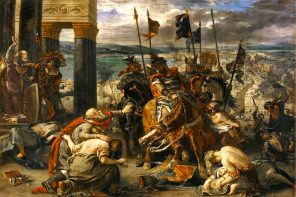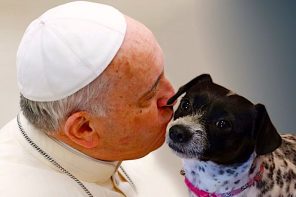Read all the posts in this series here. Doctor Who airs in the U.S. on BBC America on Saturdays at 9PM/8C (and though it’s by no means necessary, those interested in watching the first four seasons can find them streaming on Netflix) — ed.
James F. McGrath__________
The (Love) Doctor Gets Relationships and Spaceships Back On Track
Perhaps it is simply a result of writing about this season’s episodes in this format, and thus reflecting on them more carefully than I have in the case of seasons past. But it seems to me that in every episode thus far this season, the science fiction element serves as a parable or metaphor for some more down-to-earth problem and its resolution.
In this episode, “The Lodger,” the TARDIS finds itself in a “holding pattern,” unable to land, and the Doctor manages to get out of the TARDIS and keep in touch with Amy, still on board, while investigating what is preventing the TARDIS from materializing.
The Doctor rents a room in a house which is also the location of the time distortion. The man he rents it from, Craig Owens, is secretly in love with his female friend Sophie. He passes up better jobs so as not to move away from her, but doesn’t tell her how he feels. She feels the same way about him, and likewise hasn’t told him.
Meanwhile, using a perception filter to disguise itself as a second story to the house he lives in, a marooned spaceship has an automated emergency holographic program, which is looking for a pilot, luring people into the ship and connecting them to it, thus far always killing them in the process.
Craig himself was of no use to the program, as it turns out, because the ship responds to the pilot’s thoughts, and Craig was made unsuitable to be a pilot precisely because he didn’t want to leave the place where he is, and thus would not have caused the ship to launch. Eventually, in order to get the ship to shut down and disappear, Craig would have no choice but to put his hand on the ship’s control and state out loud what he had not managed to until then: he loves Sophie, and wants to stay where she is.
There is a symbolic parallel between the ship and the human characters. The ship cannot leave because it has no one to tell it to depart. Craig wants to stay but is hiding the reason. Sophie at one point talks about leaving to travel and do environmental work with animals, reciprocating Craig’s feelings but likewise keeping them secret, and looking for a reason to stay. And while the Doctor comments on the stupidity of the mindless automated program seeking a pilot for the ship, the human characters likewise run through routines, failing to exercise the freedom that could change their lives, and thus remaining marooned much like the ship. We have in this episode both a literal and a metaphorical “failure to launch” set in symbolic parallel to one another.
This episode perhaps works better as a parable of romance than a parable of religion. But particularly in the past hundred years, popular religion in the Christian tradition has placed a lot of focus on making a decision. Whether one is thinking of the existentialist theology of Rudolf Bultmann or the evangelical Gospel as reduced to a brief tract with “four spiritual laws,” a lot of emphasis is placed on “making a decision for Christ,” taking a “leap of faith.”
It may seem ironic, then, that those same religious traditions that emphasize making a decision, a radical and decisive change and direction, often also emphasize conformity. One doesn’t make a radical choice to take one’s own path, but to follow the rules of a different group.
Yet the irony is not as marked as might first appear. Whether one’s decision is about a romantic relationship or religion, it often relates to matters of emotion, of belonging, and of making sense of one’s life and one’s place in the grand scheme of things. And so the need to make decisions and take action, and the desire to belong and relate to others, are both connected to these broader issues of the meaning of human existence—to religion and to romance. And both likewise distinguish us from an automated holographic program, programmed to follow instructions and resolve specific problems, but incapable of creative, original thought.
And so the challenge of this episode is both to “lodge” and to break free, to dare to think and act with courageous independence, but also to dare to commit and to belong.
Gabriel Mckee__________
The Lodger
Last year, I gave a three-part seminar on superheroes and religion at the Cornerstone Musical Festival. (I also did a video-blog of the music festival, which you can watch here.) My seminar was in the “Imaginarium” tent, where the festival’s pop culture seminars and movie screenings are held, and was part of a broader grouping of lectures on heroes, both “super” and otherwise, and the tension between reality and fantasy, extraordinary imagination and ordinary reality. Reading through the descriptions of the other seminars on offer before the festival, I was struck by the extent to which my fellow speakers viewed the core concept of superheroes—individuals with “powers and abilities beyond those of normal men”—with distrust. The majority of the seminars dealing with superheroes questioned the very concept of “specialness” as a Nietzschean seduction away from the Christian exaltation of ordinariness. I talked about Nietzsche too, but I found meekness at the heart of characters like Superman and Spider-Man. For many of my fellow speakers at Cornerstone, there is an insurmountable boundary between the superpowered extraordinary and the meek ordinary.
That same tension between the special and the not-so-special is also at play in “The Lodger.” Craig, the real star of this story, is the ultimate “ordinary,” a shy schlub whose life is about as unadventurous as they come. His closest relationship, with his similarly shy would-be-girlfriend Sophie, is stuck in neutral, and likely to stay that way. Into this supremely ordinary existence breaks the supremely extraordinary Doctor. And the immediate result of this new, spectacular presence is not good, not good at all. Craig begins to fear that this odd new presence, by virtue of his wit, his charm, his downright oddness, will take Sophie away from him, either romantically (Sophie makes eyes at the new lodger more than a few times) or geographically (after the Doctor encourages her to become an animal rescue volunteer in a faraway land). The Doctor then shows up Craig with some brilliant plays at his weekly football game (that’s soccer to you), and, when Craig sleeps past his alarm one morning, the Doctor stands in for him at his job (with great success).
Craig’s frustration at this invasion of the extraordinary is palpable. What right has this intruder to underscore how utterly conventional he is? The contrast between the two is the meat of this episode, and at first the Doctor comes off as… well, as the villain, really. But after seeing how Craig sees the Doctor in the first half of the episode, the second half begins to show us how the Doctor views Craig, and there things begin to turn around. For all his adventuring in time in space, the Doctor finds as much wonder in the life of a man whose greatest joy comes from “pizza and telly” as he does in the mysteries of ancient alien civilizations or the fires of distant suns. In the closing moments of the episode, the Doctor looks at Craig and Sophie with something like envy, because their lives will be full of things that he can never really have, not least of them love.
In this, we begin to see the broader context of the Doctor’s admonition in last week’s episode, “Cold Blood,” to “be extraordinary.” In Craig and Sophie, we have what appear to be the very definition of “ordinary,” and yet they somehow seem to fulfill his commandment. That’s because the Doctor’s conception of “extraordinary” isn’t the opposite of “ordinary”—he utterly rejects that opposition. He opts for a view that is perhaps a bit more paradoxical, like the simultaneous “lodging” and breaking free that James mentions. Alien spaceships aside, the relationship between Craig and Sophie is extraordinarily ordinary, but that means it’s extraordinarily human—and, for the Doctor, that is the most wonderful thing in the universe.




